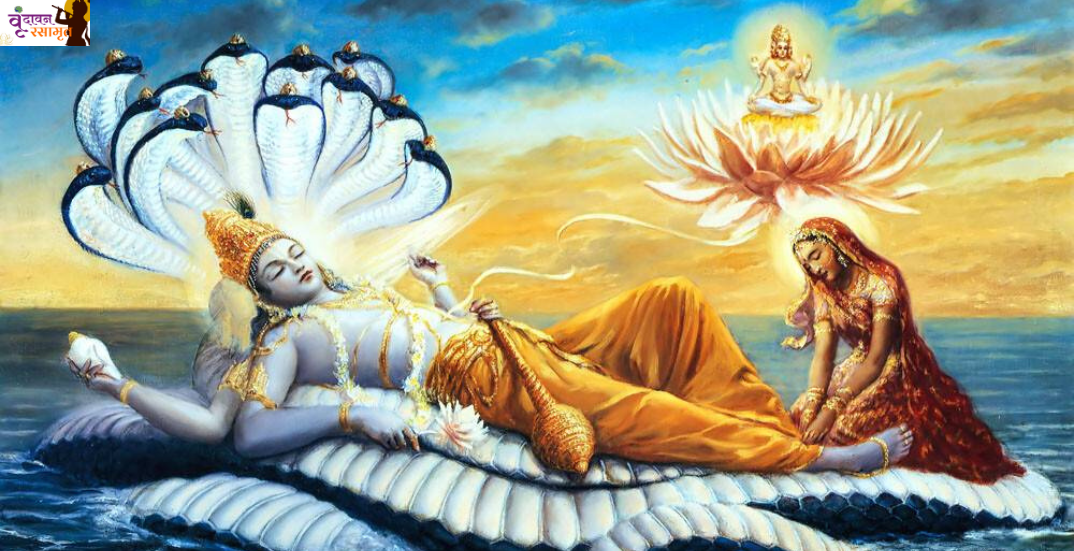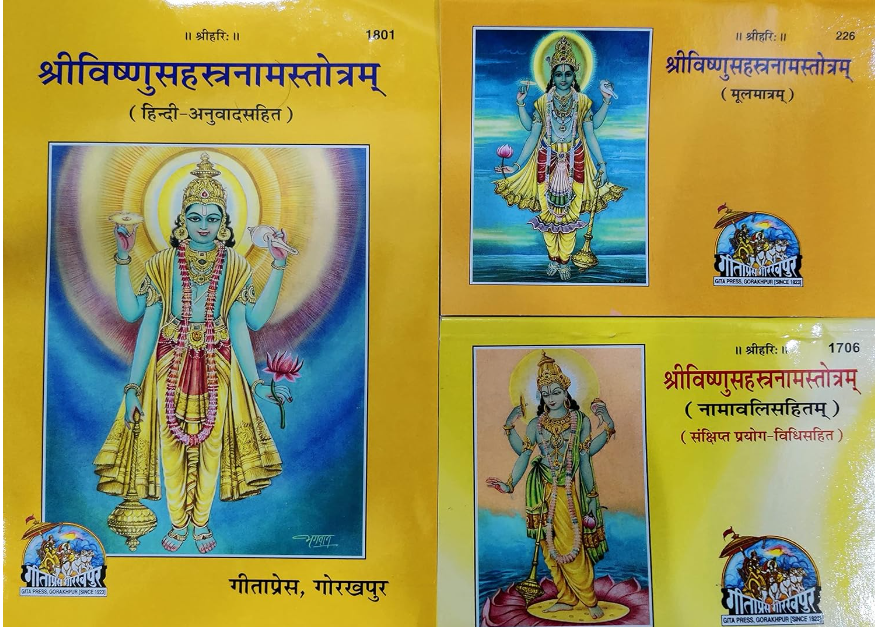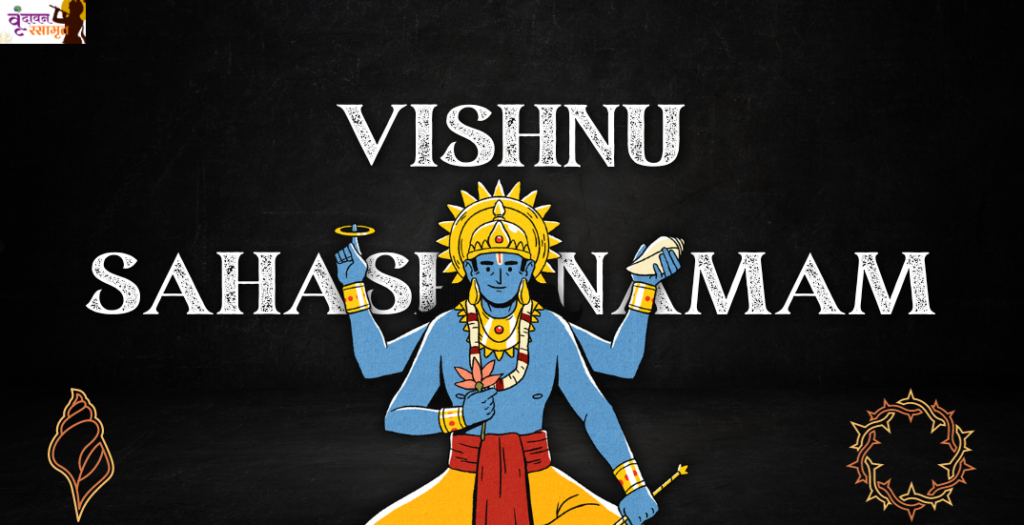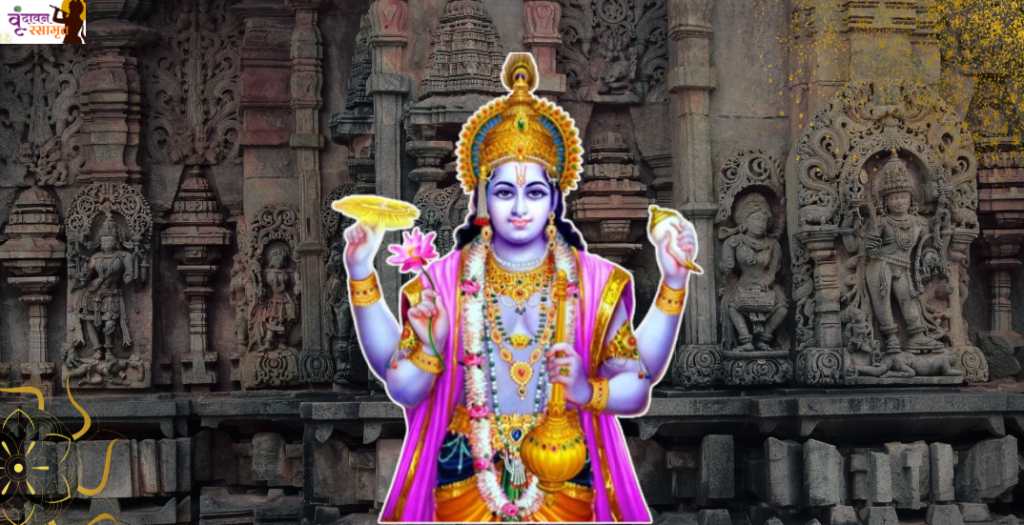Vishnu Sahasranamam, this is a well-known topic. There is a lot of information available on the internet regarding this topic. Today in this article we will give you complete information related to Vishnu Sahasranamam.
Even if you are new and do not know anything about Vishnu Sahasranamam, you will still get information through this article in simple language and through our prestigious scriptures of our Vedic Culture.
So Vishnu Sahasranamam is very special for everyone and for those who are engaged in their respective devotional paths in Vaishnav traditions. Further in this article why is Vishnu Sahasranamam so important? Will tell you this also.
Our ancestors also give us this command, in a way they give us direct advice that we should regularly recite these Sahasranamas of Vishnu. But the dilemma is that nowadays due to the huge influence of social media, our youth do not get all these things. Yes, it is very important.
Now without further ado, let us come to the point:
The Origins of Vishnu Sahasranamam
Shri Vishnu Sahasranamam is mentioned in the 149th chapter of Anushashanaparva of Mahabharata. In this festival, after the war, when the Pandava sons all together, at the behest of Lord Shri Krishna, go to seek advice from Grandfather Bhishma.
Bhishma, who was an unbroken celibate, despite being in pain while lying on the bed of arrows, gives good advice and knowledge to Yudhishthir for running the kingdom. Bhishma gives Veera to his speech and in the end also sings the praise of Shri Krishna, which today people sing with great emotion in the name of Bhishma Stuti.
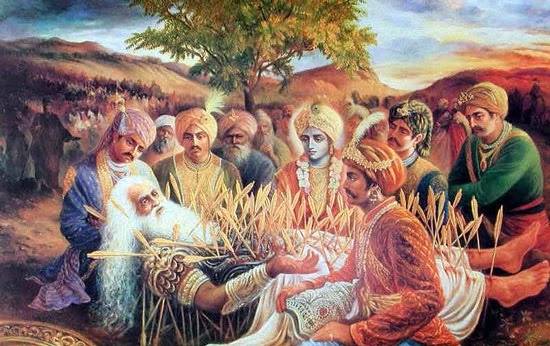
Yudhishthir ji asks the question, Grandfather! Who is the only God in the entire world and who is the only ultimate refuge in this world? By chanting the praises of which God and by worshiping which God in various ways externally and internally, can a person attain welfare? (Mahabharata: Anushashanaparva, Chapter 149, Verse 1)
Yudhishthir Maharaj again asks, which one do you consider to be the best among all the religions? And by chanting whom does the living being become free from the bondage of the world of birth and death? (Mahabharata: Anushashanaparva, Chapter 149, Verse 2)
Then Bhishma Pitamah, to satisfy the curiosity of Maharaj Yudhishthir, while giving him the secret knowledge of Lord Vishnu, explaining to him his name, Gun and the importance of his company, recites Shri Vishnu Sahasranamam (1000 Names of Shri Vishnu).
And this is how Shri Vishnu Sahasranamam is composed. (Mahabharata: Anushashanaparva, Chapter 149, Verse 4-121)
The Essence of Vishnu Sahasranamam
Each name in the Sahasranamam is not just a label but a doorway into the infinite attributes of Vishnu, the preserver and protector within the Hindu Trinity. These names are echoes of the divine, capturing His essence in all its multifaceted glory.
When one recites these names with devotion, it is not merely an act of praise but a journey through the vast expanse of Vishnu’s attributes, from his omnipotence to his benevolence, his omnipresence to his ineffable majesty.

The recitation of Vishnu Sahasranamam is more than a spiritual exercise; it is a meditative absorption into the divine. It is believed to bestow peace, clarity, and spiritual progress, aligning the reciter with cosmic rhythms.
Each name is a bead in a garland, stringing together the human consciousness with the divine, creating a bridge between the temporal and the eternal.
Philosophically, the Vishnu Sahasranamam embodies the essence of dharma, or righteousness, inherent in the universe. It encapsulates the belief that the divine is not remote but intimately entwined with our lives and the cosmos.
The thousand names serve as a reminder of the infinite possibilities of realization and the myriad paths to the divine, encouraging a holistic view of life’s journey, harmoniously blending devotion, knowledge, and action.
The Structure and Composition of Shri Vishnu Sahasranamam
Sahasranamam of Shri Vishnu composition is not just a simple enumeration of names, but a deeply structured and spiritually significant work.
The Thousand Names: The central part of the text, the thousand names, are not randomly compiled but are organized in a poetic and thematic manner. The names reflect various attributes of Vishnu – his qualities, his actions, his manifestations, and his relationships with the universe and its beings. Each name is a compound word in Sanskrit, rich in meaning and philosophical depth.
Phonetic and Rhythmic Elements: The composition is in classical Sanskrit and adheres to strict metrical patterns, making it not just a spiritual journey but also an aesthetic experience. The phonetics and rhythm are designed in a way that chanting the Sahasranamam has a calming and purifying effect on the mind and soul.
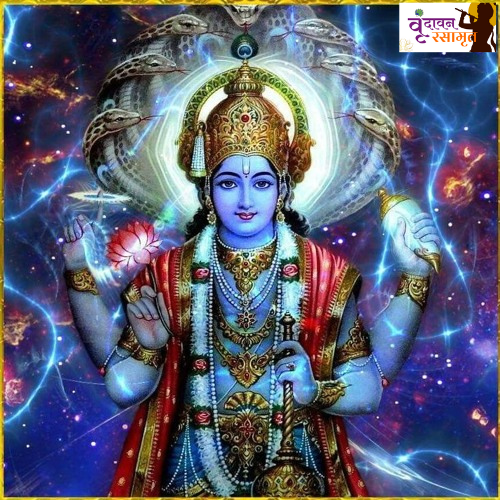
Philosophical and Theological Significance: Each name in the Vishnu Sahasranamam is a doorway to understanding a different facet of the divine. The names cover a spectrum of theological and philosophical teachings, reflecting the all-encompassing nature of Vishnu.
The Vishnu Sahasranamam, thus, is much more than a list of names. It is a spiritual journey, a philosophical treatise, and a work of poetic beauty, offering a comprehensive view of the multifaceted divinity of Lord Vishnu.
Key Themes in Shri Vishnu Sahasranamam
In the Vishnu Sahasranamam, the profound concepts of Dharma, Karma, and Moksha are beautifully encapsulated. ‘Dharmadhyaksha,’ meaning the overseer of Dharma, highlights Vishnu as the embodiment of cosmic order and ethical principles, guiding us towards righteous living.
‘Karmaphalaprada,’ translating to the giver of the fruits of actions, represents the principle of Karma, emphasizing the significance of our actions and their consequences, instilling a sense of accountability.
Lastly, ‘Mokshapradayaka,’ meaning the granter of Moksha, positions Vishnu as the divine guide aiding devotees in their pursuit of liberation from the cycle of birth and death, urging them towards spiritual enlightenment and the realization of the soul’s eternal unity with the divine.
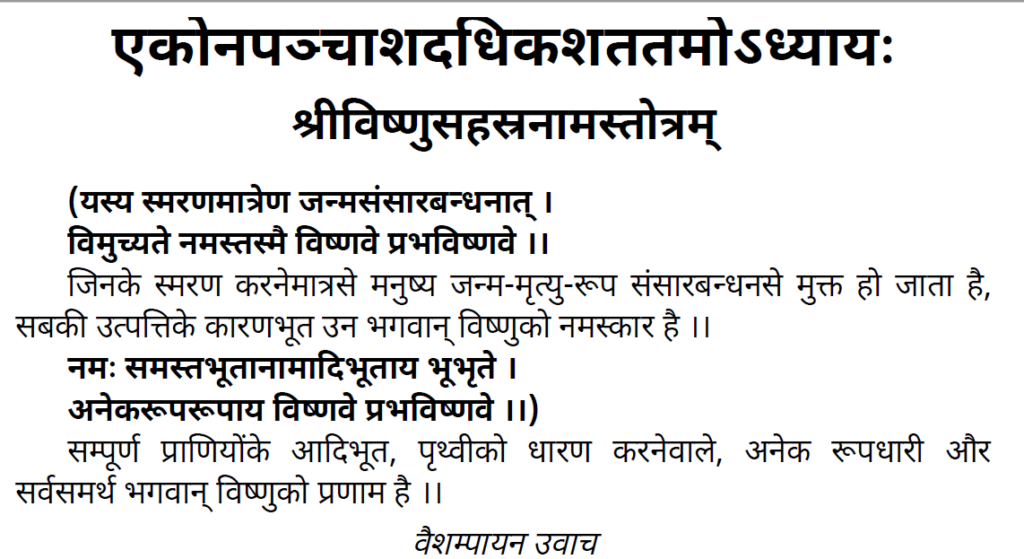
These names collectively underscore the importance of living a life of moral integrity, being accountable for our actions, and seeking spiritual transcendence.
Each name of Vishnu in the Sahasranamam is a doorway to understanding these profound concepts, offering guidance and wisdom. As we delve into the meanings behind these names, we uncover layers of philosophical depth, learning how to live a life of purpose, responsibility, and spiritual fulfillment.
- Vishvam – This name signifies Vishnu as the universe itself, embodying the entire cosmos within Him. It reflects the concept that the divine is not separate from the creation but is its very essence.
- Vishnuh – Meaning ‘the all-pervading one,’ this name denotes Vishnu’s omnipresence. It’s a reminder that the divine consciousness permeates everything in existence, from the smallest particle to the vast expanse of the universe.
- Narayana – This name translates to ‘the refuge of all beings.’ Narayana represents the ultimate shelter and protector of the universe, symbolizing the aspect of God as the savior and guardian.
- Padmanabha – Literally meaning ‘one with a lotus emerging from his navel,’ this name refers to the cosmic origin of creation, where the universe is said to have originated from a lotus that sprouted from Vishnu’s navel.
- Damodara – A name with deep affectionate connotations, meaning ‘one with a rope around his waist,’ referring to a famous childhood story of Lord Krishna (an incarnation of Vishnu). It symbolizes the divine’s accessibility and intimacy with His devotees, who can bind Him with their love.
- Shridhara – ‘The bearer of fortune,’ this name signifies Vishnu as the source of all prosperity, wealth, and well-being. It reflects the aspect of the divine as the bestower of abundance and blessings upon the universe.
Benefits of Chanting Shri Vishnu Sahasranamam
Spiritual Benefits of Chanting Vishnu Sahasranamam:
- Cultivates inner peace, fostering tranquility and harmony.
- Promotes mindfulness, focusing attention on the present and away from external distractions.
- Facilitates a deeper connection with the divine, nurturing unity with the higher self and the cosmos.
- Mental and Physical Benefits:
- Enhances memory and improves concentration.
- Sharpens intellect.
- Promotes overall well-being.
- Alleviates stress and anxiety.
- Boosts immunity.
Anecdotes from Sacred Texts:
In the Mahabharata, Arjuna chants Vishnu Sahasranamam to overcome fear and anxiety before the battle of Kurukshetra.
The Bhagavata Purana narrates Dhruva’s story, a young prince who attains spiritual enlightenment through chanting.
Impact of Chanting:
- Chanting Vishnu Sahasranamam has a profound impact on both spiritual and worldly aspects of life.
- Leads to inner peace, mental clarity, and physical well-being.
- Embarks individuals on a journey towards tranquility and health through the melodious recitation of divine names.
How to Begin Your Journey with Vishnu Sahasranamam
Here’s a guide to help beginners begin their recitation or listening practice:
Find a Quiet and Comfortable Setting: Dedicate a specific time and space for your practice, free from distractions. A serene environment conducive to concentration will enhance your experience.
Listen to Recordings: Before attempting to recite the Sahasranamam on your own, listen to recordings by experienced chanters. This will help you familiarize yourself with the proper pronunciation, intonation, and rhythm of the chant.
Start with Smaller Portions: Begin by reciting or listening to a few names at a time, gradually increasing the number as you become more comfortable.
Utilize Resources: Numerous books, online resources, and mobile applications provide the complete text of the Sahasranamam along with transliterations and translations. These resources can aid in understanding the meaning of the names, deepening your connection to the chant.
Join a Group or Community: Consider joining a group or online community dedicated to chanting Vishnu Sahasranamam. The collective energy and support of fellow practitioners can enrich your experience.
Practice Regularly: Consistency is key to reaping the benefits of chanting. Dedicate a few minutes each day to your practice, even if it’s just a few names.
Explore Further: As you progress, delve deeper into the spiritual significance and symbolism of the thousand names. This exploration will enhance your understanding and appreciation of the chant.
Remember, the journey with Vishnu Sahasranamam is a personal and transformative one. Embrace the process with devotion, patience, and an open mind, and allow the divine names to guide you on your path towards spiritual awakening.
Conclusion
Thank you for joining us on this enlightening journey through Vishnu Sahasranamam. May the profound insights and timeless wisdom you’ve discovered inspire and guide you towards a path of inner peace, spiritual growth, and enlightenment.
We are grateful that you chose Vrindavanrasamrit.in as your companion in this sacred exploration. Your engagement and quest for understanding are deeply appreciated. Continue to embrace the light of divine knowledge, and let it illuminate your life’s path.

